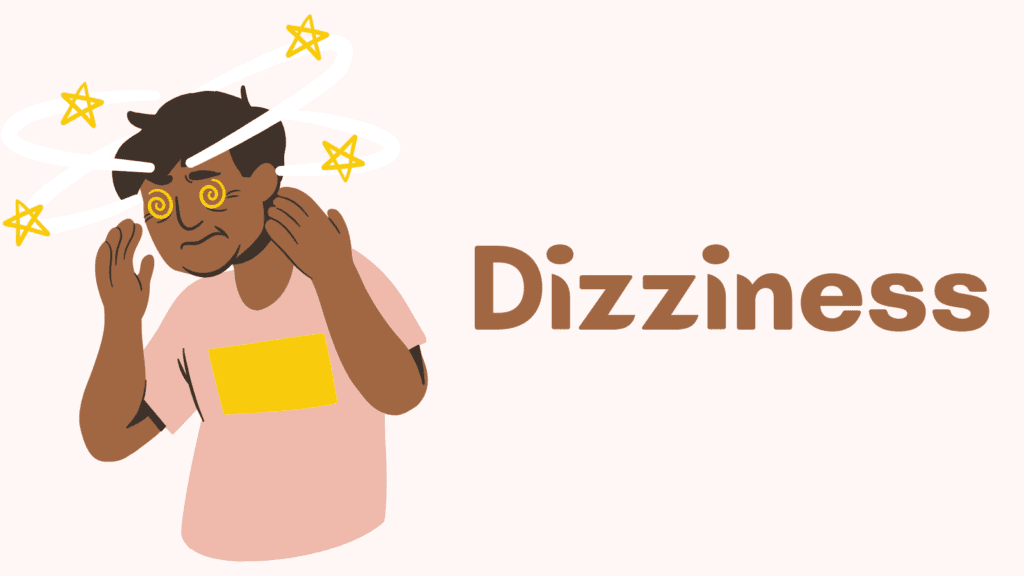Exploring the Causes, Symptoms, and Coping Strategies for Dizziness

Dizziness is a common and often unsettling sensation that many people experience at some point in their lives. It can manifest in various forms, ranging from lightheadedness to a spinning sensation. While occasional dizziness is usually benign, recurrent or severe bouts may indicate an underlying health issue. In this blog post, we’ll explore the causes, symptoms, and coping strategies for dealing with dizziness.
Causes of Dizziness
Dizziness can be caused by a variety of factors, and understanding the underlying causes is essential for effective management. Here are some common reasons why individuals may experience dizziness:
- Inner Ear Disorders:
- Labyrinthitis: Inflammation of the inner ear can disrupt the balance mechanism, leading to dizziness, nausea, and sometimes hearing loss.
- Benign Paroxysmal Positional Vertigo (BPPV): Tiny calcium particles in the inner ear can become dislodged and trigger sudden, intense bouts of vertigo.
- Dehydration:
- Inadequate fluid intake can result in a decrease in blood volume and low blood pressure, leading to dizziness and lightheadedness.
- Low Blood Sugar:
- A sudden drop in blood sugar levels, often associated with conditions like diabetes or reactive hypoglycemia, can cause dizziness and weakness.
- Anemia:
- Insufficient red blood cells to transport oxygen to the body’s tissues can result in fatigue, weakness, and dizziness.
- Medication Side Effects:
- Certain medications, such as antihypertensives, antidepressants, and sedatives, may cause dizziness as a side effect.
- Cardiovascular Issues:
- Conditions like arrhythmias, low blood pressure (hypotension), or inadequate blood flow to the brain due to heart problems can lead to dizziness.
- Neurological Conditions:
- Disorders such as migraines, multiple sclerosis, or tumors affecting the brain can cause dizziness as a symptom.
- Infections:
- Viral or bacterial infections affecting the inner ear, such as vestibular neuritis, can result in dizziness.
- Motion Sickness:
- Sensitivity to motion, often experienced during car rides, boat trips, or flights, can lead to dizziness, nausea, and vomiting.
- Psychological Factors:
- Stress, anxiety, and panic disorders can contribute to dizziness. The body’s stress response can affect blood pressure and trigger a feeling of lightheadedness.
- Meniere’s Disease:
- An inner ear disorder characterized by episodes of vertigo, hearing loss, and ringing in the ears (tinnitus).
- Postural Orthostatic Tachycardia Syndrome (POTS):
- A condition where changes in body position, especially from sitting to standing, lead to a rapid heart rate and dizziness.
Symptoms of Dizziness
Dizziness can manifest in various ways, and the symptoms may differ from person to person. Here are common symptoms associated with dizziness:
- Lightheadedness: A feeling of being unsteady or on the verge of fainting without a spinning sensation.
- Vertigo: A spinning, whirling, or tilting sensation, as if the environment is moving around the person. This is often described as a “room spinning” feeling.
- Unsteadiness: Difficulty maintaining balance, often feeling wobbly or like you might fall.
- Nausea: A sensation of queasiness or the urge to vomit may accompany dizziness, especially in cases of severe vertigo.
- Weakness: Feeling physically weak or having a sense of muscle fatigue.
- Sweating: Experiencing increased perspiration, particularly when dizziness is associated with anxiety or stress.
- Visual Disturbances: Blurred vision, difficulty focusing, or seeing “spots” may occur with dizziness.
- Confusion: Feeling mentally foggy or disoriented.
- Fainting (Syncope): In extreme cases, dizziness may lead to loss of consciousness.
- Headache: Some individuals may experience headaches or migraines along with dizziness.
- Tinnitus: Ringing, buzzing, or other noises in the ears may accompany dizziness, especially in conditions like Meniere’s disease.
- Sensations of Floating or Swimming: Feeling like you are floating or swimming, even when you are stationary.
Coping Strategies
Coping with dizziness involves a combination of lifestyle adjustments, self-care strategies, and, in some cases, medical intervention. Here are some effective coping strategies to manage and alleviate dizziness:
- Stay Hydrated:
- Ensure you are drinking an adequate amount of water throughout the day to maintain proper hydration. Dehydration can contribute to dizziness.
- Balanced Diet:
- Eat a nutritious and balanced diet rich in vitamins and minerals, especially iron. This can help prevent anemia, a potential cause of dizziness.
- Manage Stress:
- Practice stress-reduction techniques such as deep breathing, meditation, yoga, or progressive muscle relaxation. Stress can exacerbate dizziness.
- Gradual Movements:
- Avoid sudden changes in position, especially when getting up from lying down or sitting. Move slowly to prevent a sudden drop in blood pressure.
- Medication Review:
- Consult with your healthcare provider to review medications. Adjustments or changes may be necessary if dizziness is a side effect of medication.
- Physical Therapy:
- For individuals with vestibular disorders, specific exercises prescribed by a physical therapist can help improve balance and reduce dizziness.
- Regular Exercise:
- Engage in regular, moderate exercise to improve cardiovascular health. Activities like walking, swimming, or cycling can be beneficial.
- Avoid Triggers:
- Identify and avoid triggers that worsen dizziness. This may include certain foods, caffeine, alcohol, or activities that provoke symptoms.
- Adequate Sleep:
- Ensure you are getting enough quality sleep. Fatigue can contribute to dizziness, so prioritize restful sleep.
- Use Supportive Measures:
- Consider using assistive devices like canes or walkers for stability, especially if balance is a significant concern.
- Hygiene Maneuvers:
- For individuals with benign paroxysmal positional vertigo (BPPV), specific head and body movements (Epley maneuver) may help reposition displaced inner ear crystals.
- Stay Mindful:
- Be mindful of your body’s signals. If you feel dizzy, take a moment to sit or lie down until the sensation passes.
- Hydrotherapy:
- Alternating between warm and cool water in the shower may stimulate circulation and help alleviate symptoms for some individuals.
- Vestibular Rehabilitation:
- This is a specialized form of physical therapy focused on improving vestibular function and reducing dizziness.
- Acupuncture:
- Some people find relief from dizziness through acupuncture, a traditional Chinese medicine technique that involves inserting thin needles into specific points on the body.
When to Seek Medical Attention
While occasional and mild dizziness may not always be a cause for concern, certain situations warrant prompt medical attention. Here are some signs and scenarios indicating the need to seek medical help:
- Severe or Prolonged Dizziness:
- If dizziness is intense, persistent, or lasts for an extended period, it’s crucial to consult with a healthcare professional.
- Fainting (Syncope):
- Loss of consciousness associated with dizziness requires immediate medical attention, as it may indicate a serious underlying issue.
- Head Injury:
- If dizziness follows a head injury, seek medical help promptly, as it could be a sign of a concussion or other head trauma.
- Chest Pain or Difficulty Breathing:
- Dizziness accompanied by chest pain, shortness of breath, or difficulty breathing may indicate a cardiovascular or respiratory emergency and requires immediate medical attention.
- Speech or Vision Changes:
- Sudden changes in speech, vision, or difficulty moving one side of the body could suggest a stroke, and emergency medical care is essential.
- Numbness or Weakness:
- Dizziness accompanied by numbness or weakness, especially on one side of the body, could be a sign of a neurological issue and requires urgent medical evaluation.
- Persistent Vomiting:
- Continuous vomiting associated with dizziness may lead to dehydration, requiring medical intervention.
- Sudden Hearing Loss or Ringing in the Ears:
- These symptoms, especially when accompanied by dizziness, may indicate an inner ear problem like Meniere’s disease and should be evaluated by a healthcare professional.
- New or Worsening Symptoms:
- If dizziness is a new symptom or if existing symptoms worsen, it’s advisable to seek medical attention for a comprehensive evaluation.
- Age-Related Concerns:
- Dizziness in older adults may be associated with a higher risk of falls, and it’s important to address the underlying cause to prevent injuries.
- Recent Medication Changes:
- If dizziness coincides with a change in medications, consult with a healthcare provider promptly, as it may be a medication side effect or interaction.
- Underlying Health Conditions:
- Individuals with pre-existing health conditions such as diabetes, heart disease, or neurological disorders should seek medical attention if dizziness occurs, as it may be related to their underlying health issues.
If you or someone you know experiences persistent or concerning dizziness, don’t hesitate to consult with a healthcare provider. Early intervention can lead to a timely diagnosis and the implementation of coping strategies or medical treatments, ultimately contributing to improved well-being and quality of life. Stay proactive about your health, and prioritize seeking medical attention when needed.
Disclaimer
The information provided in this blog post is for informational purposes only and should not be considered as medical advice. It is not intended to replace professional medical diagnosis, treatment, or guidance. Always consult with a qualified healthcare professional for advice on your individual medical condition. If you are experiencing severe or persistent symptoms, seek immediate medical attention. The author and publisher of this content are not responsible for any adverse effects or consequences resulting from the use of the information provided.
Stay updated—subscribe now for informed empowerment!

